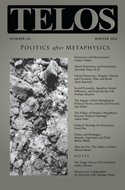Aryeh Botwinick’s “Liberal Democracy, Negative Theory, and Circularity: Plato and Rawls” appears in Telos 161 (Winter 2012). Read the full version online at the Telos Online website, or purchase a print copy of the issue in our store.
 This paper argues that the best kind of philosophical defense of democracy is one that is worked out within the framework of negative theory. The phrase “negative theory” is being used on analogy with the term negative theology. Just as negative theology argues that we can only indefinitely say what God is not but cannot pinpoint in a positive sense what He is, so, too, negative theory advocates that we can only ceaselessly explore and highlight the limitations of reason, without being able to arrive at a positive content that is incontrovertible and uncontestable.
This paper argues that the best kind of philosophical defense of democracy is one that is worked out within the framework of negative theory. The phrase “negative theory” is being used on analogy with the term negative theology. Just as negative theology argues that we can only indefinitely say what God is not but cannot pinpoint in a positive sense what He is, so, too, negative theory advocates that we can only ceaselessly explore and highlight the limitations of reason, without being able to arrive at a positive content that is incontrovertible and uncontestable.
Some of the most dramatic manifestations of a negative theoretical approach to political governance are found in the implicit acknowledgements of the inevitability of circularity insinuated by some of the major philosophers of Western thought. In this paper, I analyze Plato’s argument in the Theaetetus in order to illustrate the ways in which Plato is committed to the thesis of the inevitability of circularity—and to address some of its political implications. In the second part of the paper, I try to show how a deep reading of Rawls’s meta-ethical theory connects it with an acknowledgement of the inevitability of circularity, which re-evokes the structure of the Platonic argument in the Theaetetus.
Viewing circularity as a permanent feature of argument is symptomatic of a deep-seated skepticism. The paper points to pronounced rhetorical affinities between skepticism and the practice and theory of democracy.



